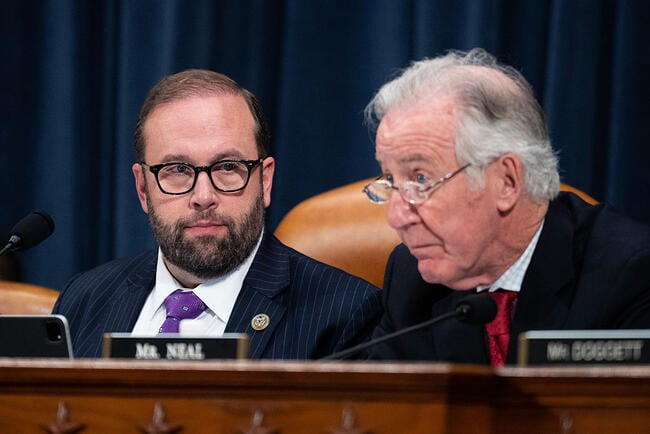You have /5 articles left.
Sign up for a free account or log in.

Tom Williams/CQ-Roll Call, Inc via Getty Images
Efforts to raise endowment taxes are in motion as the House Ways and Means Committee reportedly plans to unveil changes next week that will increase rates and include more colleges.
Education leaders have worried about such a rate increase for months. Now the GOP-led committee is expected to propose raising endowment excise taxes from 1.4 percent to up to 21 percent, depending on endowment value per student, Punchbowl News, Politico and other outlets reported.
The proposed endowment tax would only apply to private institutions, as it does currently.
Under the proposed formula, institutions with endowments of $750,000 to $1.25 million per student would reportedly be hit with 7 percent excise tax. That number would climb to a 14 percent tax for colleges with endowments valued at $1.25 to $2 million per student. Colleges at the highest level with endowments of $2 million or more per student would pay 21 percent. (Currently, colleges with endowments worth $500,000 per student or more pay the 1.4 percent tax.)
The specifics of the tax increase aren’t final and could shift before the committee’s hearing Tuesday.
Republicans are preparing to move forward with endowment tax increases as part of a broader effort known as reconciliation to cut billions in federal spending and pay for President Donald Trump’s priorities. Other House committees have unveiled their proposed cuts for reconciliation, including a sweeping plan to upend the student loan system, but the Ways and Means bill is crucial to this process.
GOP motivations for the tax increase appear to be twofold in that it would help fund tax cuts and serve as a punitive measure for colleges they believe have gone “woke.” In 2023, a total of 56 universities paid roughly $380 million in endowment excise taxes.
“Seven years ago, the Trump tax cuts sparked an economic boom and provided needed relief to working families,” committee chairman Jason Smith, a Missouri Republican, said in a Friday statement. “Pro-family, pro-worker tax provisions are the heart of President Trump’s economic agenda that puts working families ahead of Washington and will create jobs, grow wages and investment, and help usher in a new golden age of prosperity. Ways and Means Republicans have spent two years preparing for this moment, and we will deliver for the American people.”
The proposal comes amid the president’s full blown attack on higher education, which has seen the federal government clamp down on research funding, go after colleges for alleged antisemitism, take aim at diversity, equity, and inclusion programs, and attempt to deport international students.
Since the 1.4 percent endowment excise tax was passed in 2017 during the first Trump administration, higher education leaders have long worried that the president would raise it in his second term.
As universities increased their lobbying efforts in the early days of Trump 2.0, the potential increase to the endowment tax has been a key concern. Recent lobbying reports show that Harvard University, which has the largest endowment, recently valued at more than $53 billion, Princeton University, Northwestern University, and multiple others have pressed Congress on the issue. (Northwestern’s chief investment officer said last week that the potential increase would be “destructive.”)
Smaller institutions, some of which had never hired federal lobbyists before 2025, have also raised concerns about how expanding the endowment tax would harm their educational mission.
According to an analysis from James Murphy, director of career pathways and post-secondary policy at Education/ Reform Now, only three universities would pay the highest rate at 21 percent—Princeton, Yale University and the Massachusetts Institute of Technology. Another 10 universities, including Harvard, would get hit with the 14 percent rate.
An analysis published last month by the investment firm Hirtle Callaghan noted that recently proposed changes to the endowment excise tax would “significantly broaden the universe of colleges and universities that pay the tax from large, wealthy institutions to smaller, regional ones.” That analysis warned that such increases “threaten to do irreparable damage to many schools which are significantly weaker financially than the schools paying the current tax.”
Multiple higher education associations have previously expressed opposition to the increase.
Last fall, American Council on Education president Ted Mitchell sent a letter to Congress, co-signed by 19 other associations, calling for the repeal of the existing endowment tax, arguing that “this tax undermines the teaching and research missions of the affected institutions without doing anything to lower the cost of college, enhance access, or address student indebtedness.”




